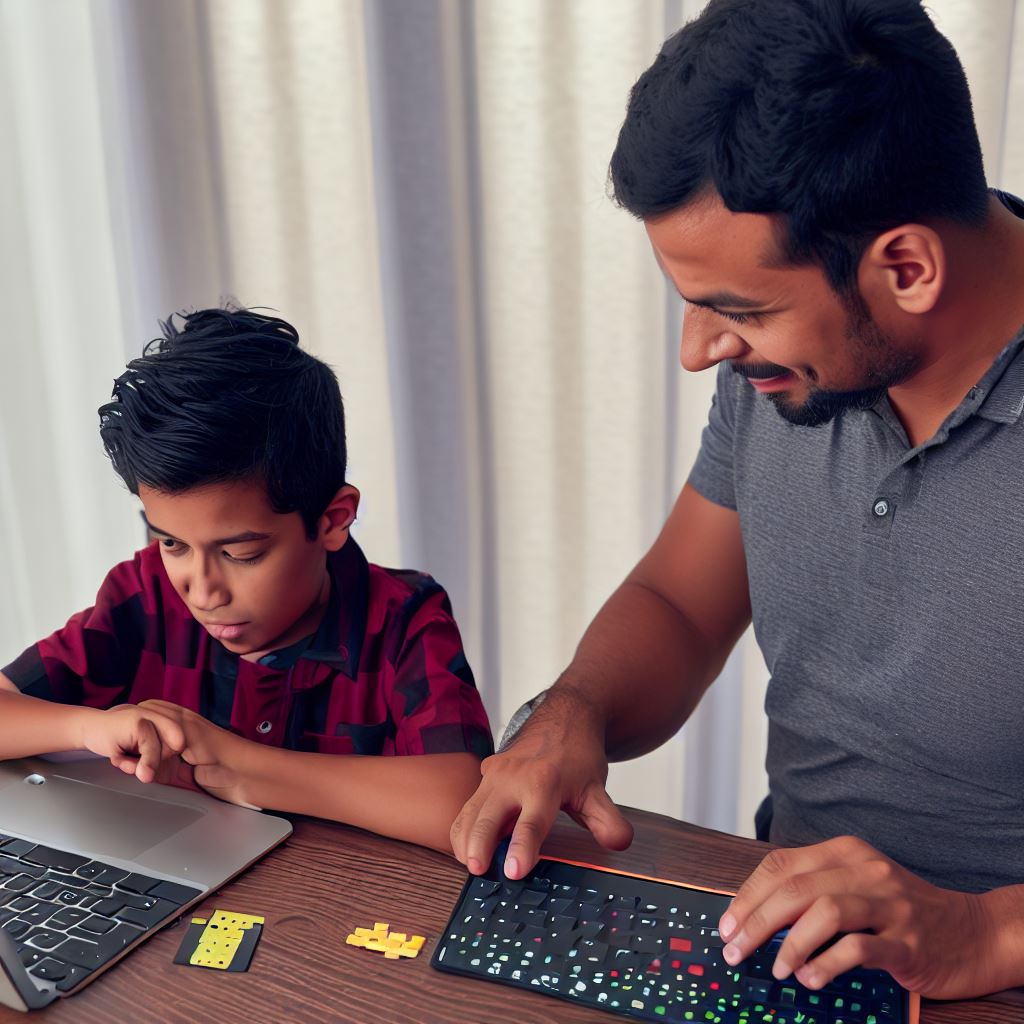Introduction
Coding is an essential skill in the 21st century, empowering children to thrive in a technology-driven world.
As parents, it is crucial to guide our kids towards acquiring this proficiency.
However, teaching coding to kids can be challenging without the right approach. Here are some do’s and don’ts to help parents navigate this exciting journey successfully.
Do’s
- Start with age-appropriate coding platforms or toys that make learning interactive and enjoyable.
- Encourage experimentation and creative thinking to foster problem-solving skills.
- Provide a supportive environment where mistakes are welcomed and learning from them is encouraged.
- Collaborate with your child by participating in coding projects together, promoting a sense of teamwork.
- Celebrate small achievements and milestones to maintain motivation and boost confidence.
Don’ts
- Avoid forcing coding upon kids; instead, spark their interest with real-world examples and applications.
- Do not overload kids with complex concepts too quickly; introduce coding gradually, focusing on fundamentals.
- Refrain from controlling or micromanaging the coding process; let kids explore and discover on their own.
- Don’t dismiss non-coding activities; encourage a healthy balance between coding and other interests.
- Steer clear of criticizing or belittling their progress; provide constructive feedback and encourage continuous learning.
By following these do’s and don’ts, parents can create a positive and effective learning environment for their kids to develop coding skills.
Remember, the goal is not just to teach coding; it is to nurture their curiosity, creativity, and problem-solving abilities, which will serve them well in any field they choose.
Let’s embark on this coding journey with our children and witness their growth and success.
Read: Scratch vs. Python: Which is Best for Young Coders?
The Do’s for Parents
Start with simple concepts and age-appropriate tools
When introducing coding to kids, it is crucial to choose the right programming language or platform. Consider their age, interests, and current knowledge level.
Younger children may benefit from visual and block-based coding languages like Scratch or Blockly, which provide a user-friendly interface and simple concepts to grasp.
Older kids can explore text-based programming languages like Python or JavaScript. Selecting the appropriate tools will facilitate their learning process.
Parents should also recommend beginner-friendly resources that provide step-by-step instructions, interactive tutorials, and coding projects suited for beginners.
Coding apps, websites with gamified learning, and online courses specifically designed for kids can be excellent choices.
Encourage hands-on learning experiences
To enhance kids’ understanding and application of coding concepts, it is essential to encourage hands-on learning experiences.
Engage them in coding projects and challenges that enable them to practice problem-solving skills.
This can involve creating simple games, interactive stories, or even small webpages.
Tech Consulting Tailored to Your Coding Journey
Get expert guidance in coding with a personalized consultation. Receive unique, actionable insights delivered in 1-3 business days.
Get StartedPractical coding practice reinforces their knowledge and helps them develop confidence and independence in coding.
Providing resources and tools for coding practice is equally significant.
Coding kits that include components like sensors, motors, and microcontrollers enable children to build interactive projects and see their code come to life.
Programmable toys like robots or drones can also be engaging tools for hands-on coding exploration.
Foster a supportive and encouraging environment
Coding involves trial and error, and it’s essential to promote failure as a learning opportunity.
Encourage kids not to be discouraged by mistakes but to persevere and learn from them.
Emphasize that coding is an iterative process, where continuous improvement happens through experimentation and problem-solving.
It is vital for parents to celebrate their children’s achievements and progress.
Recognize their accomplishments, whether small or big, and acknowledge their efforts.
This positive reinforcement boosts their self-esteem and motivation, making them more eager to continue learning and exploring coding concepts.
Make it a fun and interactive experience
To keep kids engaged and motivated, it is crucial to make coding enjoyable. Incorporate games, puzzles, and challenges into their coding journey.
Gamified coding apps or websites often provide a playful learning experience and enable kids to have fun while mastering coding skills.
Solving puzzles and challenges not only enhances their logical thinking but also adds an element of excitement and satisfaction to their learning process.
Parents can also encourage collaboration by creating opportunities for kids to work on coding projects together.
Build Your Vision, Perfectly Tailored
Get a custom-built website or application that matches your vision and needs. Stand out from the crowd with a solution designed just for you—professional, scalable, and seamless.
Get StartedThis could involve organizing coding clubs or participating in coding events where children can collaborate, share ideas, and learn from one another.
Collaborative coding experiences promote teamwork, communication, and problem-solving skills.
By following these do’s, parents can provide their children with a solid foundation in coding.
Starting with simple concepts, encouraging hands-on learning, fostering a supportive environment, and making coding fun and interactive will ensure that kids develop a passion for coding and continue to explore and excel in this essential skill.
Read: Is Coding for Kids Just a Trend or a Necessary Skill?
The Don’ts for Parents
When teaching kids to code, parents should be aware of certain don’ts to create a positive learning environment.
The following are some important don’ts to keep in mind:
Avoid overwhelming kids with complex concepts too soon
It is crucial to start with basic programming principles to establish a strong foundation for learning.
Introducing complex concepts too early can lead to frustration and confusion.
Gradual progression allows kids to build their knowledge and skills at a comfortable pace.
Don’t discourage experimentation and creativity
One of the most important aspects of coding is the ability to think creatively and find innovative solutions.
Parents should avoid limiting kids’ exploration by imposing strict rules or specific methods.
Allowing them to experiment and come up with their own coding solutions fosters creativity and problem-solving skills.
Avoid pressuring kids or setting unrealistic expectations
Parents must recognize that coding skills take time to develop.
Optimize Your Profile, Get Noticed
Make your resume and LinkedIn stand out to employers with a profile that highlights your technical skills and project experience. Elevate your career with a polished and professional presence.
Get NoticedPressuring kids or setting unrealistic expectations can dampen their enthusiasm and hinder their progress.
It’s essential to foster a growth mindset in kids, emphasizing personal growth, learning from mistakes, and enjoying the coding journey rather than comparing themselves to others.
Don’t rely solely on screen time or online resources
While online resources and screen time can be valuable tools, it’s crucial to strike a balance.
Parents should encourage hands-on activities and offline learning experiences.
By engaging in real-world coding projects and exploring outside the digital realm, kids can deepen their understanding and develop a well-rounded skillset.
Basically, parents should be mindful of the don’ts when teaching kids to code.
By avoiding overwhelming kids with complex concepts too soon, embracing experimentation and creativity, avoiding pressure and unrealistic expectations, and balancing screen time with offline activities, parents can create a supportive and effective learning environment for their children.
Read: How Coding Skills Can Help Kids in School and Life

Overcoming Common Challenges
Addressing potential challenges parents may face when teaching kids to code
Teaching kids to code can be challenging for parents, but with the right strategies and solutions, it can become a rewarding experience.
1. Lack of interest or motivation
Parents may encounter difficulties when their kids show a lack of interest or motivation in coding. However, there are ways to overcome this challenge.
Find their passion
Identify what excites your child and make connections between coding and their interests.
For example, if they love video games, show them how coding is used to create them.
Make it fun and interactive
Use gamified learning platforms or coding apps that incorporate fun challenges and rewards.
This can make coding more engaging and motivate your child to continue learning.
2. Difficulty grasping certain concepts
Kids may struggle with understanding certain coding concepts.
It’s important for parents to provide the necessary support and employ effective teaching strategies.
Break it down
Divide complex concepts into smaller, more manageable parts.
Explain each part in a simplified manner and reinforce their understanding before moving on.
Use visual aids and examples
Visual aids such as flowcharts, diagrams, or real-life examples can help clarify abstract concepts.
Show how coding is relevant and applicable in everyday situations.
3. Encouraging perseverance and problem-solving skills
Coding requires persistence and problem-solving skills.
Parents can foster these qualities in both themselves and their kids through specific approaches.
Lead by example
Demonstrate perseverance in your own coding projects.
Let your child see how you face challenges, overcome obstacles, and continue learning from failures.
Teach problem-solving strategies
Introduce strategies like breaking problems into smaller steps, testing and debugging code, and seeking help from online resources or coding communities.
4. Sharing success stories and inspiring examples
One effective way to motivate both parents and kids is by sharing success stories and inspiring examples of young coders who have thrived in their coding journey.
Highlight real-world achievements
Share stories of young coders who have created their own apps, websites, or started their own businesses.
Explain how coding skills have empowered them in various fields.
Showcase diverse role models
Expose your child to a range of successful coders from different backgrounds.
Show that coding is for everyone, regardless of gender, race, or socioeconomic status.
By addressing potential challenges, parents can foster their children’s interest in coding, help them overcome obstacles, and inspire a lifelong passion for learning.
Read: Hour of Code: A Free Way to Introduce Kids to Coding
Conclusion
Recap of the do’s and don’ts for parents when teaching kids to code
Parents, start with the basics, DON’T overwhelm them with complex concepts too soon.
Make it fun and interactive, DON’T force it upon them.
Provide guidance, DON’T do their work for them.
Celebrate their achievements, DON’T push them too hard.
Encourage creativity, DON’T limit their exploration.
Final thoughts on the benefits of learning coding at an early age
Learning to code at a young age offers immense advantages.
It fosters problem-solving skills, enhances logical thinking, and boosts creativity.
It instills resilience and perseverance, vital for future success.
Plus, it opens doors to exciting career opportunities in a tech-driven world.
Encouragement for parents to embark on this journey with their children
Parents, embarking on this coding journey with your kids is a rewarding adventure.
It’s a chance to bond, learn together, and witness their growth.
Embrace their curiosity, and remember, you’re not just teaching code; you’re nurturing their future.
Call to action for parents to start teaching kids to code, utilizing the provided guidelines
Now, it’s time to take action. Grab a coding book, explore online resources, or enroll in coding classes.
Use the guidelines we’ve provided to kickstart this exciting journey.
Your children’s future is in your hands, and with coding, the possibilities are limitless.
Start today, and watch them thrive in a digital world!
Teaching kids to code is a gift that keeps on giving.
So, parents, get ready to code, learn, and grow with your little tech enthusiasts.
Together, you’ll shape a brighter tomorrow.




